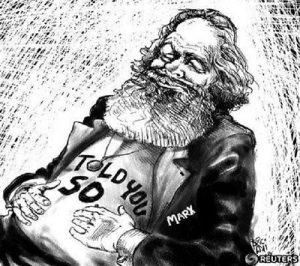Economics
Economic Inequality in America
By Dr. Hassan Shirvani–The impressive body of empirical evidence recently furnished by the French economist Thomas Piketty and his associates clearly demonstrates that there is a worsening trend of income and wealth inequality in America. This trend, in effect since the beginning of the 19th century, managed to take a breather in the first half of the…
Read MoreIs There An Aerotropolis In Your Future?
By Dr. Roger Morefield — AEROTROPOLIS – THE “FIFTH WAVE” An aerotropolis is a city anchored by an airport. Your first reaction to this may be, “huh?” Like most people, you might see the airport as a place to get in and out of as quickly as possible, and not a very good place…
Read MoreThe Economics of Karl Marx
By Dr. Hassan Shirvani —Karl Marx (1818-1883) was one of the most influential economists of the 19th century. His economics provided a bridge between the classical economics (1776-1850) and the neoclassical economics (1870-1936), with the latter being a precursor to the modern conservative economics. Indeed, much of the neoclassical economics was a reaction against and…
Read MoreDoes the U.S. Government Debt Fit in a Bucket?
By Dr. Pierre Canac —Nobody will disagree that $12.8tn is a large and potentially scary number! That is the U.S. Gross Federal Debt held by the public at the end of 2014. However, if you divide this number by the U.S. Gross Domestic Product which is $17.7tn, we get about 73%. Is this a large…
Read MoreOil and Gas Industry: Good Advice from WEN Speaker
By Carolina Quintana Sanchez —Earlier this month, CSB and UST students joined Women’s Energy Network (WEN) guest speaker, Jeannie Gardner, who has more than 20 years of experience in the Oil and Gas Industry. She provided an insightful view on low oil prices, its impact on the energy industry, and gave practical advice to the audience.…
Read MoreLiquidity Traps: Old and New
By Hassan Shirvani—- The concept of a liquidity trap, introduced by the British economist John Maynard Keynes during the Great Depression of the 1930s, refers to the situation in which monetary policy becomes largely impotent in lowering interest rates to stimulate additional borrowing and spending in the economy. This can result from the fact that…
Read MoreIs it Time for Europe to Call in the Helicopter?
By Dr. Pierre Canac– “Let us suppose now that one day a helicopter flies over this community and drops an additional $1000 in bills from the sky, …. Let us suppose further that everyone is convinced that this is a unique event which will never be repeated,” (Friedman 1969, pp 4–5). In one of…
Read MoreGermany and Greece Need to Learn How to Tango Together
By Dr. Pierre Canac—Prior to the 2007-2008 financial crisis, cross-countries financial flows triggered global imbalances whereby some countries experienced large current account surpluses (and capital outflows) while others faced large current account deficits (and capital inflows). Current Account and Capital Flows A country with a large current account deficit by definition has a large excess…
Read MoreNegative Interest Rates: Unusual and a Difficult Phenomenon to Explain
With respect to interest rates, we live in a very interesting and indeed historical time. In some European countries, nominal interest rates are negative (while they are close to zero in the United States). A short while back this was thought to be impossible. Until it actually happened, it would have been difficult to imagine…
Read MoreFallacy of Composition in Economics
By Dr. Hassan Shirvani —-The fallacy of composition refers to the logically untenable position that what is true for a member of a group must necessarily also be true for the group as a whole. Perhaps a good example of this fallacy is the assertion that since an individual in a crowded room can obtain…
Read More








